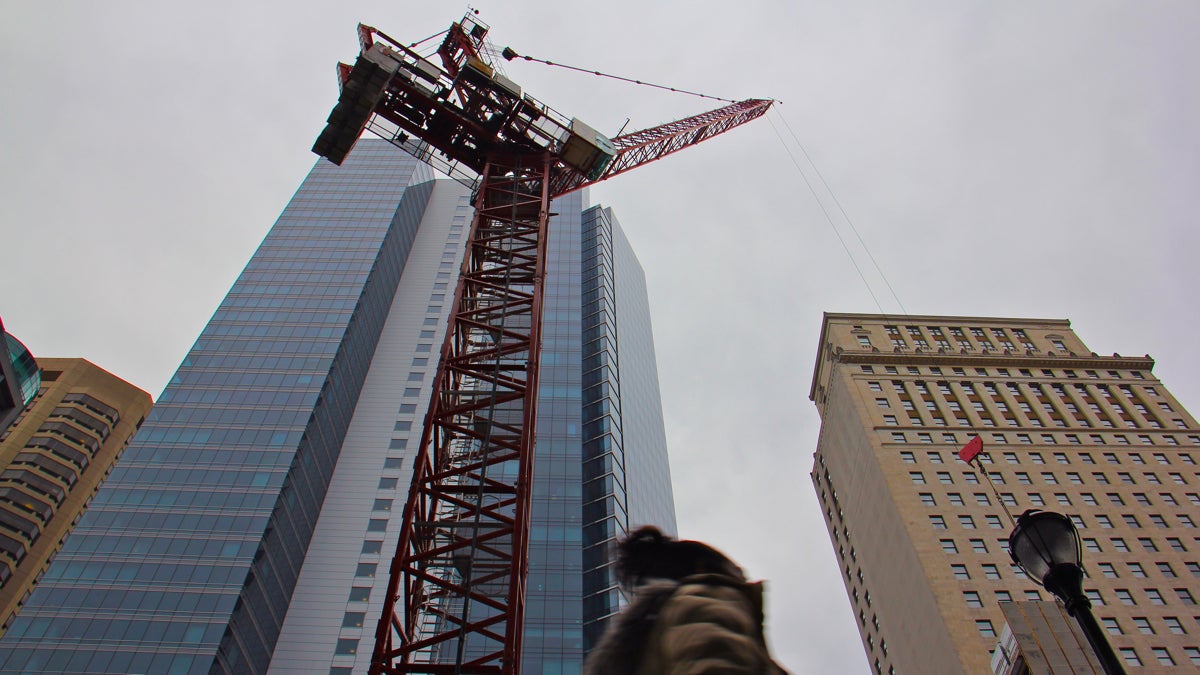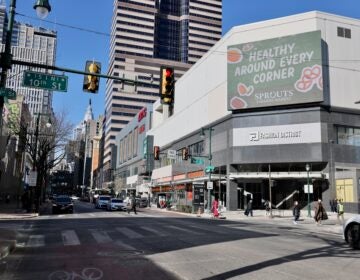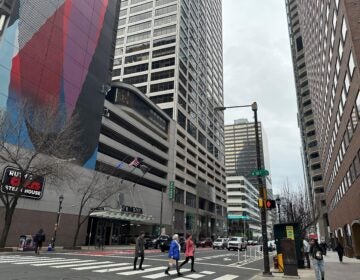Construction tax’s fate uncertain as City Council wraps up for summer
The fate of a proposed 1 percent construction tax for Philadelphia remained up in the air Thursday, during the last City Council session before the summer recess.

A large crane looms over the 1400 block of Chestnut Avenue. (Emma Lee/WHYY)
The fate of a proposed 1 percent construction tax for Philadelphia remained up in the air Thursday, during the last City Council session before the summer recess. The bill squeezed past with a 9-8 vote in favor, far tighter than anyone expected even 24 hours ago.
The Republicans on the council were joined in opposition by Democrats Bobby Henon, Derek Green, Jannie Blackwell, Cindy Bass, and Allan Domb. No speeches were given for or against the bill.
The majority vote in favor is not veto-proof. Although Mayor Jim Kenney has never exercised his veto power before, his administration has criticized the construction tax repeatedly in recent weeks. Spokesman Mike Dunn said they are still studying the legislation.
In a statement following the vote, Kenney said, “I’m committed to increasing Philadelphia’s affordable-housing stock and to promoting equitable growth, but I have concerns about this particular piece of legislation. Philadelphia is already considered by many to have a pretty onerous tax system and it is certainly not clear that adding another tax is the best way to address our housing crisis.”
On Wednesday, the Finance Department released a memo describing a negative effect on the city’s finances if the legislation were enacted.
“Even in a strong market for real estate development… we conservatively project that the City’s General Fund will lose more revenue through lost tax revenue than it will generate for the Housing Trust Fund through the tax,” said the memo, prepared with assistance from commercial real estate services firm Jones Lang LaSalle. The JLL study argued that over the next five fiscal years the city would lose more than $56 million in revenue, and that the tax itself would bring in less than $10 million a year, well below the amount estimated by Council President Darrell Clarke’s office.
The authors also cautioned that the tax would contribute to Philadelphia’s reputation as an expensive place to build in comparison with other major East Coast cities, where profit margins are often higher.
The mayor’s office also argued that the tax would be difficult to administer, at least at first, and so costs would be higher in the first year. “Jones Lang LaSalle estimates that construction volume could fall by as much as 50 to 60 percent from peak volume during an economic cycle.” Projects that do occur will be shifted toward Center City, where profits are higher, and Keystone Opportunity Zones, which are exempt from the tax, the study says.
Clarke flatly rejected the administration’s estimates, describing them in a memo to council members as an “incomplete, if not misleading, fiscal impact analysis.”
The administration underestimates how much the tax would bring in and overstates the costs of collecting the tax, Clarke said. In fiscal year 2017, he noted, the total value of building permits in the city totaled $4.6 billion. If 70 percent of those permits had been subjected to the tax, he wrote, it would have brought in $32 million. If 50 percent were subjected to it, then $27 million would have resulted. In either case, it would have been far more than would Kenney’s team projected.
Clarke’s memo also argued that the mayor’s team did not consider the economic benefit of creating more affordable housing in the city.
“While it is difficult to quantify the economic activity generated when individuals and families in need of affordable housing are finally able to acquire it, allowing them to invest in other urgent needs such as food and health care,” he wrote, “… that is clearly the goal of any affordable housing initiative.”
Meanwhile, housing activists packed Thursday’s council meeting. The Affordable Housing Coalition — an umbrella group that covers an array of affordable-housing organizations — issued a letter urging support for the construction tax, despite a campaign it has been waging to dramatically amend the legislation to earmark more of the tax revenues for the city’s poorest.
Individual members of the coalition nonetheless spoke against the construction tax as it currently stands, saying that too much attention is being given to homeowners and households with income over $100,000. They urged amendments targeting construction-tax revenues to Philadelphians living under the poverty line or for the construction tax to be voted down for the time being.
The creation of a subfund — a new portion of the Housing Trust Fund meant for the revenues from the construction tax that could then be spent under different strictures than the traditional fund — passed with a much more comfortable margin than the construction tax. Only Councilmen Henon, Green, Brian O’Neill and Al Taubenberger voted against it.
Beth McConnell, policy director for the Philadelphia Association of Community Development Corporations, pleaded against the position.
“If the bill doesn’t pass, we have zero new dollars for those who need the most support,” said McConnell.
This article has been updated to include a statement from Mayor Jim Kenney.
WHYY is your source for fact-based, in-depth journalism and information. As a nonprofit organization, we rely on financial support from readers like you. Please give today.







